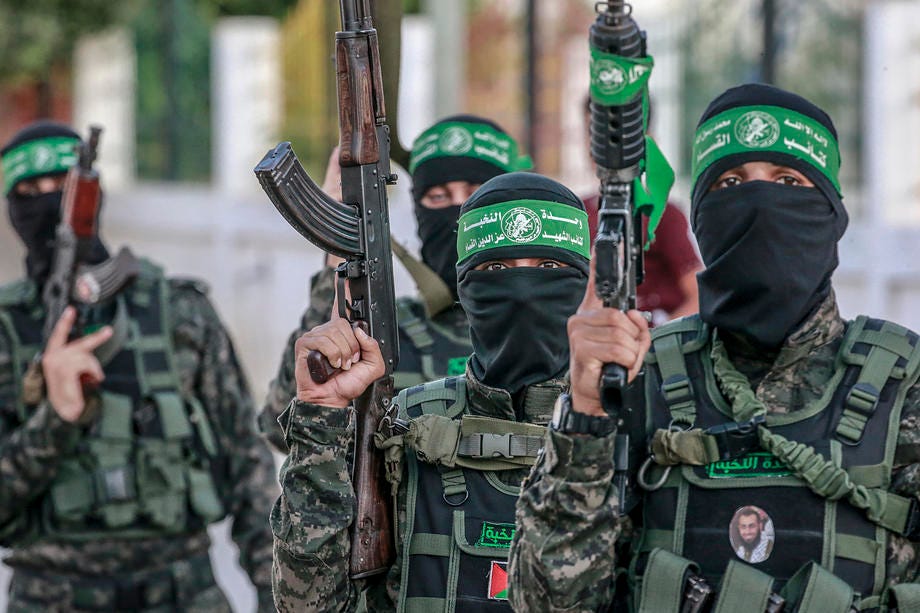Labeling Gaza’s militant rulers as “Hamas” conveniently severs Palestinian identity from its political and moral consequences. This distinction grants innocence—or at least plausible deniability—to the broader population who once cast ballots for their governance, sustain them with moral or logistical support, and share a distinct national identity separate from other Arabs. Just as early American colonists were collectively judged by the acts of their political choices—even if not every settler personally rallied behind the Sons of Liberty—the entire Palestinian populace in Gaza must be held to the standard that their representatives, or at the very least their cohabitants, have set.
Hamas did not descend upon Gaza as a foreign entity. They emerged from the local populace, earned electoral legitimacy in 2006, and have entrenched themselves through both political maneuvering and force. By continuing to call the perpetrators of violence “Hamas,” we shield the surrounding community from their share of responsibility. If Hamas is a U.S.- and EU-designated terrorist organization, how did these “outsiders” seize power unless the very people they govern had a hand in legitimizing or protecting them? Much as colonial Americans could not disclaim the overreach of the Continental Congress without disowning their own revolutionary identity, Gazans cannot simply partition “the militants” from “the populace” when the two are inextricably intertwined.
Thomas Jefferson famously wrote about the people’s sovereignty and the reciprocal obligations of government and governed. If we apply this principle to Gaza, it means that if the people are sovereign, they are responsible for what their government does—be it dispensing charity or launching rockets. The label “Hamas” is a rhetorical fig leaf, giving the impression that a violent faction is the only culprit while the wider population remains conveniently offstage. At worst, this fosters the notion of a morally neutral “bystander majority” that is neither morally nor politically accountable. But in a society where families often live mere blocks from rocket sites, where tunnels are dug under neighborhoods, and where widespread celebrations sometimes follow violent attacks, the lines blur. Those lines should be erased entirely.
This erasure is not merely theoretical—it is visible in the streets. When Israeli and American hostages were released over the past two months, jubilant crowds of Palestinians took to the streets, not in sorrow for the suffering endured by these captives, but in grotesque displays of mockery. These were not Hamas militants alone but ordinary Palestinian men, women, and children taunting and humiliating the hostages, an act not of coercion but of communal participation. There were massive parades, widespread cheers, and chants of defiance. The sheer scale of these celebrations leaves no room for the fiction that Hamas is an occupying force lording over an unwilling people. They are not its captives; they are its willing chorus.
Limiting our language to “Hamas” alone inadvertently excuses the rank-and-file population that voted for those leaders and, in many cases, still provides them cover. One recalls James Madison’s admonition that democracy and liberty rest upon an informed and responsible citizenry. If a society’s citizens fail their civic duty by electing or tolerating violent, oppressive governance, then language should reflect that complicity. How deeply do the “civilians” object to their rulers? If hostility reigns unchecked, that is in part a reflection of popular will or, at the very least, popular acquiescence. The name “Palestinian” thus becomes the rightful, unadorned term to describe those who either facilitate or do not effectively oppose these militant acts.
Furthermore, designating Hamas alone as the villain distorts how the broader conflict is understood—akin to labeling every British atrocity during the Revolutionary War as the fault of “the Redcoats” and sparing the entire British populace the blame for supporting those uniforms through their tax coffers or imperial cheerleading. The same logic must apply to Gaza: the community, the electorate, and the fighters form one national fabric called “Palestinians,” and it is a moral evasion to talk around that collective responsibility.
Some might argue that Palestinians within Gaza oppose Hamas, just as some British subjects supported American independence, but this hardly changes the moral ledger. When an overarching identity actively sustains the group in power—through shelter, silence, or direct endorsement—that identity ought to be named. If indeed an overwhelming number objected, then overthrow, sabotage, or mass civil protest would be more visible. The relative absence of such large-scale resistance is evidence that the entire population, or at least the dominant majority, remains in step with, or resigned to, Hamas’s rule.
The false dichotomy between “bad militants” and “innocent residents” must be abandoned. Instead of speaking of “Hamas,” a term that absolves anyone not wearing the official insignia, we must be candid about holding the broader Palestinian identity to account. After all, every member of Hamas is, by definition, Palestinian. By insisting on naming the collective, we deny the rhetorical sleight of hand that permits a population to step aside and deny authorship of its leaders’ actions. If people are sovereign, then they bear sovereign responsibility, no matter what banner their militants fly.
Writers, journalists, and commentators must recognize this reality in their language. The inhabitants of Gaza are not hostages of Hamas—they are its lifeblood. The global conversation must reflect this truth. Referring to them simply as “Palestinians” rather than allowing the false partition of “Hamas” grants moral clarity. It is time to end the linguistic evasion that excuses collective accountability and instead call this conflict what it is: a war waged by a nation, not just a faction.
If you don't already please follow @amuse on 𝕏.






The Gazans/Palestinians, in 2006(?), voted overwhelmingly for hamas, kicking out the Palestinian Authority, and throwing some of them off of building tops. Since then, reputable intrrnational polling agencies have shown 70%+ support for hamas. For nearly 20 years the populace has gone along with hamas militarizing civiian homes, facilities, schools, mosques, and hospitals, and likely thousands of civilians joyfully participated in the atrocities of Oct 7th. Casualties in gaza? Likely 40% hamas fighters, 60% hamas supporters.